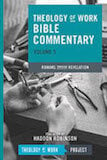Depending on God (James 1:5–18)
Bible Commentary / Produced by TOW Project.jpg)
In speaking about wisdom, James begins to develop the principle that we can trust God to provide for us. “If any of you is lacking in wisdom, ask God, who gives to all generously and ungrudgingly, and it will be given you” (James 1:5). It may seem surprising that we can ask God for wisdom about the tasks of ordinary work—making decisions, assessing opportunities, trusting colleagues or customers, investing resources, and so on—but James tells us to “ask in faith, never doubting” that God will give us the wisdom we need. Our problem is not that we expect too much help from God at work, but that we expect too little (James 1:8).
It is absolutely essential to grasp this. If we doubt that God is the source of all we need, then we are what James calls “double-minded.” We have not yet made up our mind whether to follow Christ or not. This makes us “unstable in every way,” and we will not be able to accomplish much for the benefit of anyone, or able even to “receive anything from the Lord” on our own behalf (James 1:7). James is under no illusions about how hard it can be to trust God. He knows all too well the trials his audience is already beginning to experience throughout the breadth of the Roman Empire (James 1:1–2). Yet he insists that the Christian life must begin with trusting God to provide.
He immediately applies this to the economic sphere in James 1:9–11. Rich people must not delude themselves that this is due to their own effort. If we depend on our own abilities, we will “wither away” even while we go about our business. Conversely, poor people should not think this is due to God’s disfavor. Instead, they should expect to be “raised up” by God. Success or failure comes from many factors beyond ourselves. Those who have ever lost their livelihood due to recession, corporate sale, office relocation, crop failure, discrimination, hurricane damage, or a thousand other factors can testify to that. God does not promise us economic success at work, nor does he doom us to failure, but he uses both success and failure to develop the perseverance needed to overcome evil. If James 2:1–8 invites us to call on God in times of trouble, then verses 9–11 remind us to call on him in times of success as well.
Notice that although James contrasts the goodness of God with the evil of the world, he does not allow us to imagine that we are on the side of angels and those around us on the side of devils. Instead, the divide between good and evil runs down the middle of every Christian’s heart. “One is tempted by one’s own desire, being lured and enticed by it” (James 1:14). He is speaking to church members. This should make us slow to identify church as good and workplace as bad. There is evil in both spheres—as church scandals and business frauds alike remind us—yet by God’s grace we may bring goodness to both.
In fact, the Christian community is one of the means God uses to raise up the poor. God’s promise to provide for the poor is fulfilled—in part—by the generosity of his people, and their generosity is a direct result of God’s generosity to them. “Every generous act of giving, with every perfect gift, is from above, coming down from the Father of lights” (James 1:17). This affirms both that God is the ultimate source of provision and that believers are responsible to do all they can to bring God’s provision to those in need.









